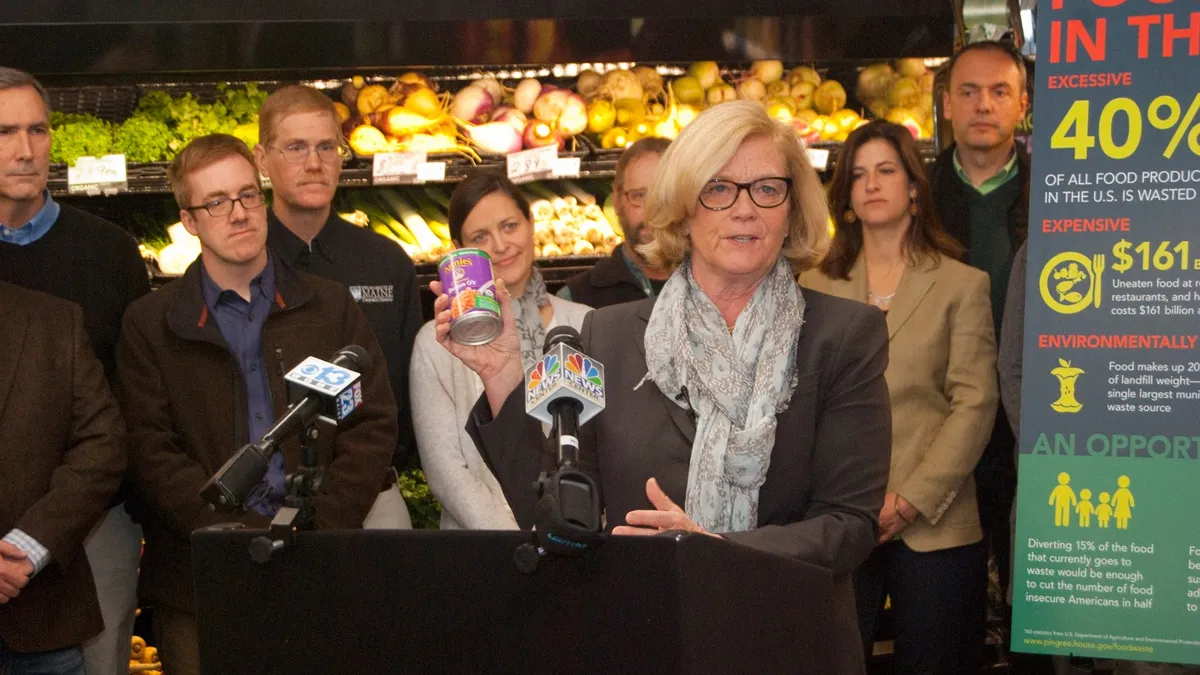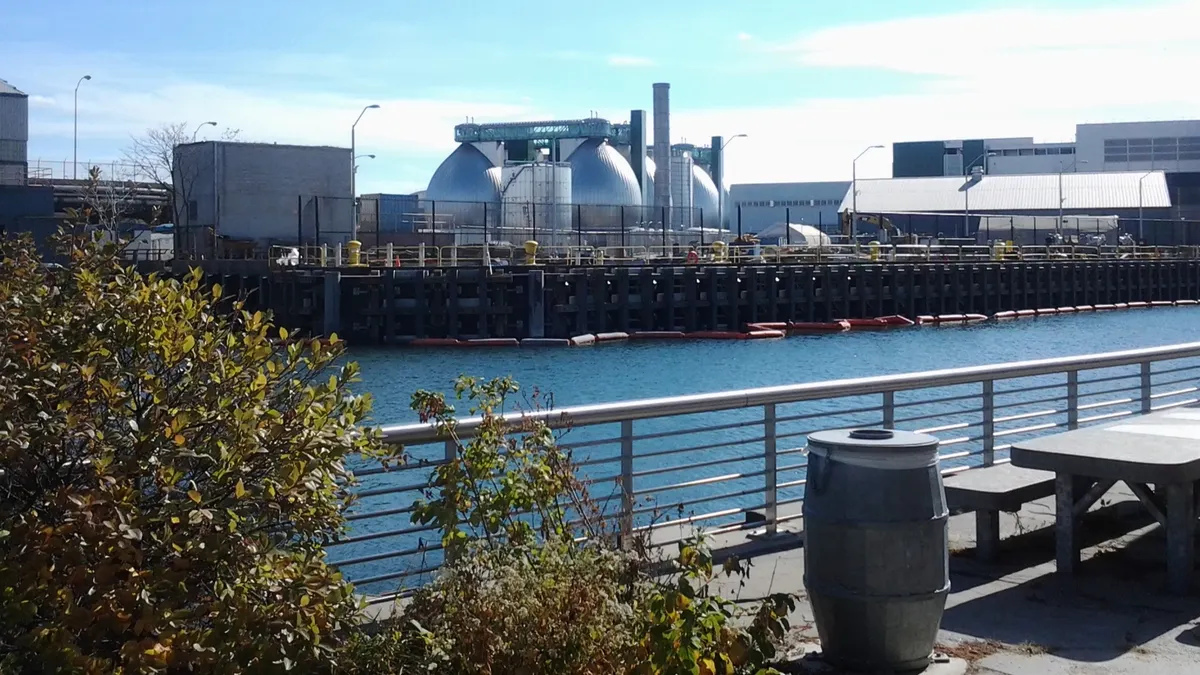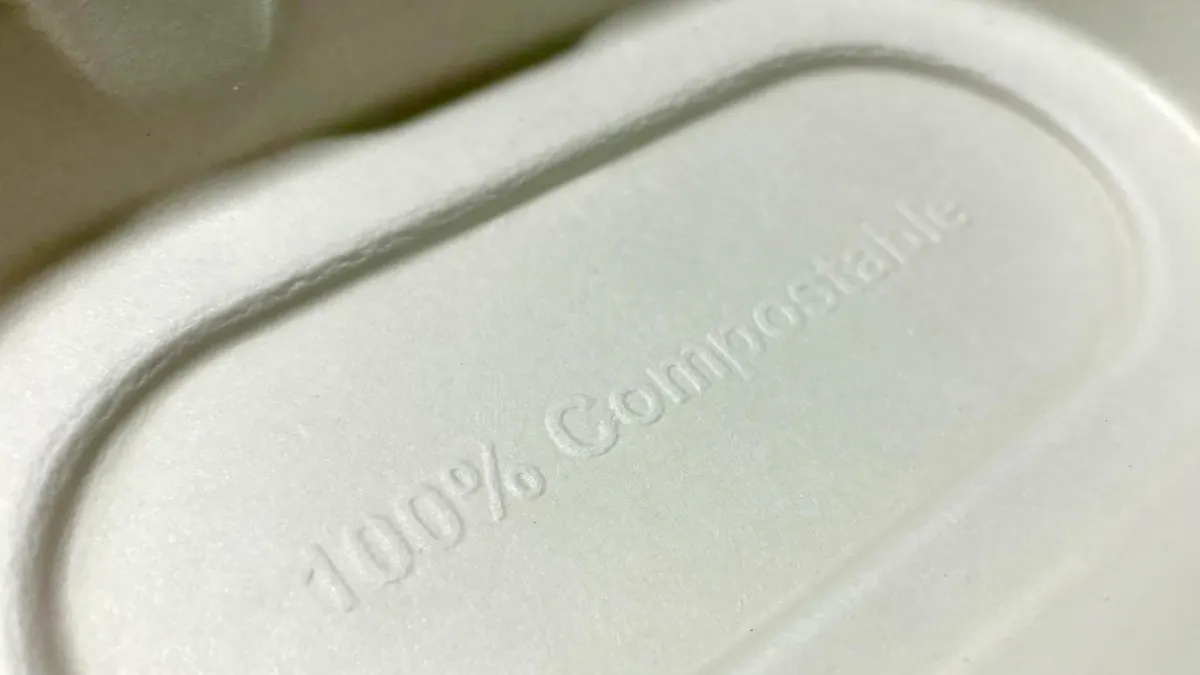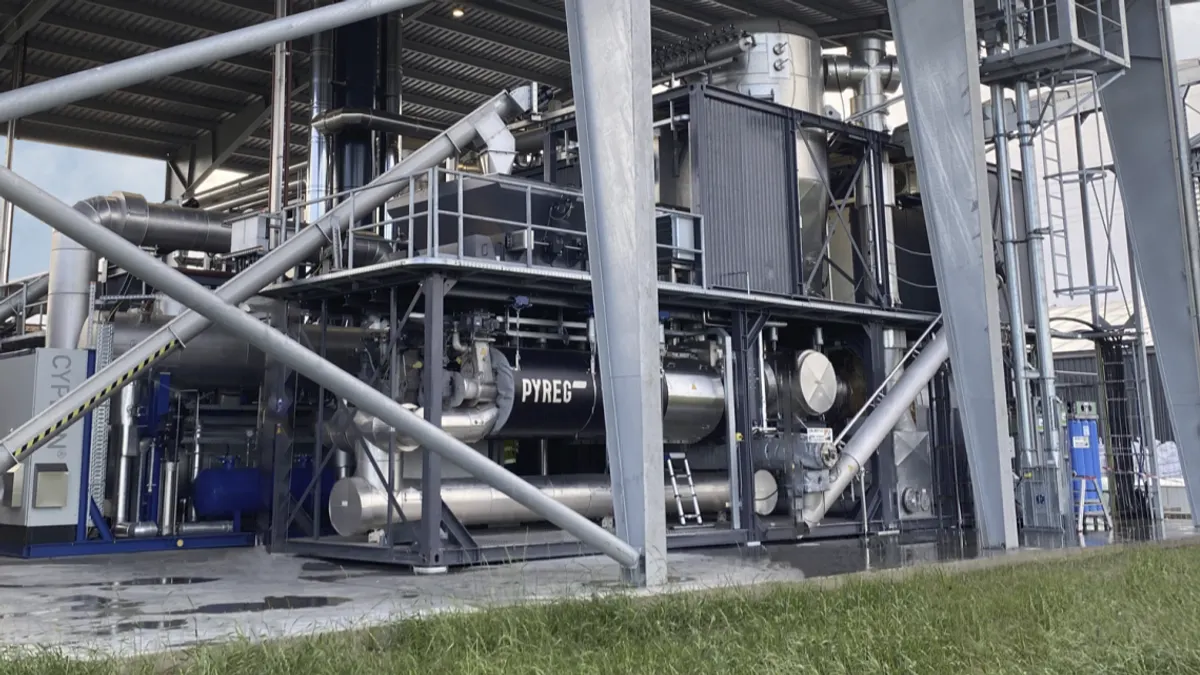Congress reauthorizes the U.S. Department of Agriculture’s budget once every five years through the farm bill, and Rep. Chellie Pingree, D-Maine, is hoping to use that rare opportunity to tackle food waste at the federal level.
This morning, the 14-year veteran of the House and member of the Agriculture Committee reintroduced the Food Date Labeling Act, designed to unify “Best if used by” and “Use by” label definitions and clarify foods past the date on the former label can still be donated.
Pingree has also reintroduced the wide-ranging Agriculture Resilience Act, which contains several food waste reduction measures that target agriculture, schools, federal contractors and more.
Alongside Rep. Dan Newhouse, R-Wash., Pingree has also helped relaunch the Bipartisan Food Recovery Caucus ahead of farm bill negotiations. Pingree launched a previous version of the caucus in 2018 ahead of that year’s farm bill.
Pingree’s vision for federal support for food waste reduction includes working with the waste industry to advance a circular economy while supporting local governments’ efforts on organics via grants and subsidies.
“I feel like there's a lot of momentum going on out there,” Pingree said. “Now, Congress just has to catch up and support them and write good policy.”
The following interview has been edited for length and clarity.
WASTE DIVE: The last farm bill was passed in 2018. How have your opinions on tackling food waste evolved since that time?
REP. CHELLIE PINGREE:

Honestly, I feel like during the last farm bill, I had fairly recently started to engage in the issue and understand how significant the issue of food waste was, both from the side of how many people go hungry in this country and aren't able to receive that food, but then the significant impact it has on landfills. During the last farm bill, we were able to move forward on a few policies, and I'm hoping that this time there's a higher level of awareness at the EPA, USDA and amongst my colleagues.
Sometimes when you talk about food waste, people's eyes glaze over because they think like, “Okay, that's not a big deal. Of course my grandmother told me not to waste food, but is it a really significant problem?” And when they understand that 30% of the food is wasted in this country and it has a significant impact on climate change and methane gas in the atmosphere, I think they start to perk up. So I'm hoping that we can have an impact on this farm bill as well, and we have a good group of colleagues who are working on this.
You also relaunched the Bipartisan Food Recovery Caucus. Tell me why you decided to do that and what specific deliverables you hope will come out of it.
It allows us to have a coalition that works with the outside groups who also have a Zero Food Waste Coalition. So it's good timing for us, and we have a variety of pieces of legislation from which we are hoping to include some of the language in the farm bill. We want to make sure that there's some appropriations funding to help fund some of the things that are already moving forward like the [USDA] Food Loss and Waste Reduction office.
We have a big section in the Agricultural Resilience Act that is a really comprehensive look at food waste. We did that so that we could compile everything in one place and attach it to the concerns related to climate change. My colleagues have a variety of other bills that I'm cosponsoring or working with them on related to compost. One act from [Rep. Julia Brownley, D-Calif.] is called the Zero Food Waste Act, [and] I'm about to come out with my Food Date Labeling Act that's an update of a bill that we've done before.
Food date labeling or the mislabeling of food creates a lot of chaos and waste in and of itself. I think ReFED estimated this would be basically the highest return on the investment — if you could fix this problem, the amount of food that got thrown away will be drastically reduced. That'll be a bipartisan bill; we're just finishing the language and it should be out very soon.
The most recent data from ReFED indicated that food waste per capita may be leveling off slightly, but we've made nowhere near the progress necessary to achieve the EPA and USDA goal of cutting food waste in half by 2030. What do you think needs to change in order to see that dramatic shift?
Well, I think it would help to have more funding both at the EPA and the USDA. But I also think it helps to have our colleagues' awareness of this. When we sit down to debate the farm bill and we're talking about commodity prices or the nutrition title, this doesn't come up because it's not controversial. But that also means people aren't passionate about fixing it. I'm going to do my best over this year to encourage more of my colleagues to see this as an issue and work with them to support it, but a lot of that action has to happen at the departments, at the EPA and USDA.
According to the EPA’s most recent data, more than 66 million tons of food waste were generated from households, grocers and other food retailers and the food services sectors in 2019. What role do you see for the federal government in tackling food waste from consumers?
One of the sections that we have in the Agricultural Resilience Act, and I had in my earlier food waste bill, is really to have the USDA conduct a food waste awareness campaign. I think that a provision to educate consumers would be great, because people often feel kind of guilty about wasting food but aren't quite sure about what to do with wasted food. As we said, food date labeling is a very concrete way to do that, but an education campaign is also a way to do that.
School food recovery, I think, is a really important component of that because kids learn things at school. They bring them home and then they're real watchdogs of their parents, like, “Why are you throwing that away? We could turn those strawberries into jam.” Kids are good that way, so I think that's an important part.
You've got a lot of cities that are ramping up composting opportunities. We know that that's a really good way for consumers, when food can't be used, to make sure that they get the food waste to a composting facility, and then it doesn't turn into something harmful to the environment.
On the side of manufacturing and processing, we do have some provisions in the bill that we could turn into law. It would require some of the contracts between food contractors and executive agencies to have a clause requiring donation of excess food and more reporting on, “How was food donated, was it composted?” It could add a lot to how people change their practices.
How do you expect the funding you're seeking in the farm bill to add to or complement previous spending packages like the Inflation Reduction Act or Bipartisan Infrastructure Law? Is biogas one of the big ways you anticipate adding on to that previous climate investment?
With the passage of the infrastructure bill and the IRA, we've provided a lot more money out there for infrastructure- and energy-related activities. I think there are going to be a considerable number of opportunities there which are also going to help support other state-based opportunities. How fast that happens is unclear, but I think we're going to see a dramatic shift in how we move towards renewable energy.
I know in Maine, we have one biodigester that is a huge recipient of food waste from a grocery store chain and other chains, as well as manure from surrounding dairy farms. We have another one of fairly significant size about to come online. Those are the kinds of things I expect to see many more of in the future. But we're hopefully getting close to this tipping point where we're seeing them and talking about them all the time. I think once they become commonplace in a few areas, there'll be more and more buy-in.
I think between biogas and composting, there are some real opportunities there. Biogas is probably never going to be a significant part of our renewable energy mix going into the future. But a small group from the Agriculture Committee last summer went to Denmark to view some of their biogas facilities and I think were really impressed with how many there were in the country, how commonplace they were and how they were dealing with food processing waste and agricultural manure and waste. I think it was an eye-opener just seeing how this could be an important part of the mix, both in dealing with the waste and in producing renewable energy.
What role do you see industry playing in the waste and renewable energy goals you've set?
Well, I think a lot of industry is being called on now by the communities where they're working to incorporate what some people call more of a circular economy — incorporate things like more sophisticated recycling [and] corporate composting facilities in their waste management strategy. I think that we're just going to continue to see a lot more of that. I know that it's more and more a part of the mix that municipalities are calling for. And while there have been a lot of startups that take kitchen waste and turn it into compost, I think it'll become more of a part of a standard mix of what waste management companies do.
California’s SB 1383 law has started to roll out and become a major part of the waste collection industry and the habits of folks in that state. Do you think there's an opportunity through federal legislation to encourage or expand those kinds of programs in other states as well?
Oh, absolutely. I think there are ways to include incentives, whether it's through federal support for waste management and recycling programs or as part of the infrastructure program. I think we're just beginning to look at creative ways that we can continue to do that, or perhaps in the future more of an incentive-based system that says, if your community is composting, doing this kind of recycling, you get a better benefit on this side. I am interested to see the ways we could possibly do that and I think that cities and states are coming to us with some of their good ideas.
What's next from a process standpoint for the farm bill deliberations? Do you know yet when we might see an initial draft?
I don't. The Republicans are in control of the House and GT Thompson, who's the chair [of the Agriculture Committee], has been very active and engaged. They have ambitious goals about getting a farm bill to the floor this summer or this fall, but my party is not in control of writing the farm bill. So we're just doing our best to be engaged fully at every level.
On the Senate side, they're also actively working on having hearings and collecting information and data. I think there's a lot of momentum and desire to complete the farm bill this year, but there's a lot of issues that will come up along the way that aren't as uncontroversial as the topic of not wasting food.
There are still ongoing negotiations regarding the debt ceiling bill as well, and I've seen that energy ended up playing a role in the final GOP version. Have you had any conversations about that yet? And do you expect budget negotiations to impact the work that you're doing with the farm bill?
Both things are going on simultaneously, and honestly it's different people. The debate around the debt ceiling is so much more with leadership and the White House at this point, it doesn't really filter into what we're doing, for instance, on the Agriculture Committee. A couple of the same issues related to nutrition also impact the farm bill, and certainly they're contentious issues and tempers can flare. But that's sort of a daily activity in Congress, so I don't know that it really impacts whether or not we'll be able to finish the farm bill.
I do think there are real issues when it comes down to having enough votes for the farm bill. Like I said, the Republicans are in control, and if they attempt to make deep cuts in the nutrition title, that will certainly lose the Democrats overall — and maybe even some of their own members.
But I've learned during my time in Congress that there's no crystal ball that actually works on Capitol Hill, because things can change overnight. If the farm bill ends up being the one thing that people feel they can get passed this year, and there's a lot of reasons they want to move it forward, all of a sudden some of those arguments will get resolved, and we'll get it done.



















